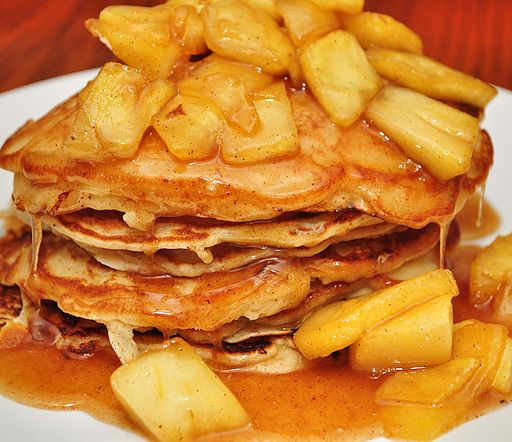Too Much of a Good Thing
When European explorers stumbled upon the New World in their search for a trade route to the Far East that bypassed Arab middlemen, they were interested in exploiting sugar resources as much as spices. The tropical and sub tropical bands of the New World – the Caribbean, much of eastern South America, Central America, and the far southeastern portion of North America – turned out to be well suited for raising sugarcane. The problem was finding a suitably cheap labor source for the backbreaking and dangerous labor involved in sugarcane cultivation as well as refinement. The Europeans, after exhausting the Native Americans as a labor source, turned to Africa as a source of slave labor.

Pancakes with syrup, or syrup with pancakes? Photo by jeffreyw.
“Big Rock Candy Mountain”, first recorded by Harry McClintock in 1928, is about a hobo’s idea of paradise. McClintock claimed to have written the song in 1895, based on tales from his youth hoboing through the United States. McClintock’s 1928 recording was used by Ethan and Joel Coen at the beginning of their 2000 film, O Brother, Where Art Thou?.
People could cut back their consumption of processed foods, and certainly they could drop sugary sodas and fruit drinks out of their diet and not lose any essential nutrients. People can use will power and self control, even though there is evidence that sugar’s effects on their health are more insidious than industry mouthpieces would have everyone believe. People can do all those things. But they don’t. Why not?
What if crack cocaine were as cheap as sugar? How about cigarettes? Opioids? What levels of consumption would we encounter then among the general population, and among the poor and working classes specifically? All those substances stimulate pleasure centers in the human brain, just like a good hit of sugar does in a smaller way, and all are ultimately destructive in high enough doses. Is sugar as destructive as those other addictive substances? No, not in the short term, and it would be ridiculous to equate a cookie with a hit of cocaine. In the long run, however, over the course of ten, twenty, or thirty years, sugar consumption at modern American levels of a hundred pounds or more per person per year is proving destructive enough. Time to turn some of that exhausted soil in the tropics over from growing monocultures of sugarcane for export to growing fruits and vegetables the locals could consume for themselves. We could easily cut back from two or three lumps of sugar to just one.
― Izzy 
